gwt-traction project on Google Code
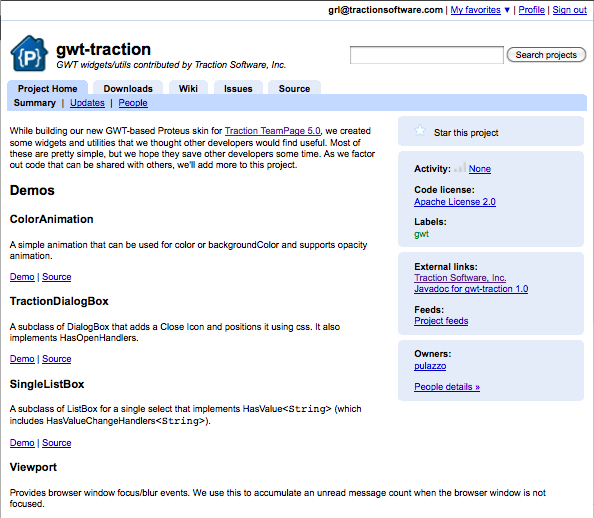 While building our new GWT-based Proteus skin for Traction TeamPage 5.0, we created some widgets and utilities that we thought other developers would find useful. Most of these are pretty simple, but we hope they save other GWT developers some time. As we factor out code that can be shared with others, we'll add more to this gwt-traction Google community project.
While building our new GWT-based Proteus skin for Traction TeamPage 5.0, we created some widgets and utilities that we thought other developers would find useful. Most of these are pretty simple, but we hope they save other GWT developers some time. As we factor out code that can be shared with others, we'll add more to this gwt-traction Google community project.
re: Social Process Reengineering?
The title of this entry had three goals. First, I wanted to convey and play off the stark differences between Social Process Reengineering and Business Process Reengineering. Second, I wanted to leverage the similarities of SPR and BPR to explain that these two processes can, and need, to co-exist rather than compete. Finally, I wanted to ask the question about whether this is the right term of the process. After dozens of conversations with the best minds in E2.0 this week, I've reconciled to a a more targeted and appropriate term: Emergineering!.
Emergineering!
 Since introducing the idea of Social Process Reengineering? earlier this week I've socialized it virtually and personally (at E2.0 Boston) with at least a dozen customers, bloggers, analysts and other leading thinkers.
Since introducing the idea of Social Process Reengineering? earlier this week I've socialized it virtually and personally (at E2.0 Boston) with at least a dozen customers, bloggers, analysts and other leading thinkers.
Consensus on the concept was generally positive with a variety of feedback ranging from the matter that the "facebook" approach doesn't just work in the enterprise to the matter that the social, structural and business pain have to be taken into account for successful E2.0 efforts.
Welcome to Traction TeamPage 5.0!
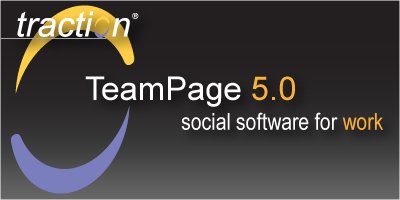 On Tuesday June 15, 2010 we'll introduce Traction TeamPage Release 5.0 to the world at the Enterprise 2.0 Conference in Boston. TeamPage Release 5.0's new generation Proteus interface technology is fast, simple, and looks great. TeamPage 5.0 leverages this technology to add extensible personal profile pages, Twitter style personal status, group live blog technology, slick and simple Feed summary and more as a natural part of Traction's award winning Enterprise 2.0 platform.
On Tuesday June 15, 2010 we'll introduce Traction TeamPage Release 5.0 to the world at the Enterprise 2.0 Conference in Boston. TeamPage Release 5.0's new generation Proteus interface technology is fast, simple, and looks great. TeamPage 5.0 leverages this technology to add extensible personal profile pages, Twitter style personal status, group live blog technology, slick and simple Feed summary and more as a natural part of Traction's award winning Enterprise 2.0 platform.
Social Process Reengineering?
As much as I hesitate to introduce this term into social software lingo, I think it's exactly what Enterprises are doing with social software on the road to Enterprise 2.0 - striving for a fundamentally new way to work.
|
Q: How do I link to an Excel file? A: Why Would you Do That?
I talked to two customers yesterday, both who came to me with some questions about attaching and linking to excel files. Easy enough, but before responding with a simple answer I challenged them: Why are you using Excel?
The spy who came in from the code | O'Reilly Radar | Carmen Medina interview
 See The spy who came in from the code for James Turner's excellent O'Reilly Radar interview with Carmen Medina who recently retired from the CIA after 32 years after serving in roles including Deputy Director of Intelligence, and Director of the CIA's Center for the Study of Intelligence. Carmen was the keynote speaker at Traction Software's Oct 2009 Traction User Group meeting, speaking on Enterprise 2.0 and the Context of Work (see slides and video). She'll speak at the Gov 2.0 Expo on May 26, 2010 Washington DC on A Match made in Heaven: High Reliability-High Risk Organizations and the Power of Social Networks. Don't miss her talk, and follow @milouness on Twitter!
See The spy who came in from the code for James Turner's excellent O'Reilly Radar interview with Carmen Medina who recently retired from the CIA after 32 years after serving in roles including Deputy Director of Intelligence, and Director of the CIA's Center for the Study of Intelligence. Carmen was the keynote speaker at Traction Software's Oct 2009 Traction User Group meeting, speaking on Enterprise 2.0 and the Context of Work (see slides and video). She'll speak at the Gov 2.0 Expo on May 26, 2010 Washington DC on A Match made in Heaven: High Reliability-High Risk Organizations and the Power of Social Networks. Don't miss her talk, and follow @milouness on Twitter!
Return On Information
Rather than thinking about communication, collaboration and KM software in terms of Return on Investment, isn't the real goal to achieve Return On Information?
Ada Lovelace Day | Fran Allen, IBM Fellow and A.M. Turing Award Winner
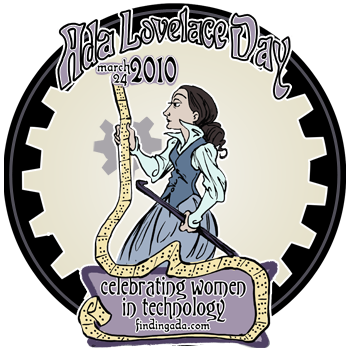 For the second annual Ada Lovelace Day, March 24, 2010 - celebrating women in science and technology - I've chosen to write about Frances E. Allen, IBM Fellow, Turing Award winner and pioneer in the theory and practice of optimizing compilers. I've never had the pleasure of meeting her in person, but I'll take the liberty of calling her Fran, as Dick Merwin and everyone I know called her in their Fran stories.
For the second annual Ada Lovelace Day, March 24, 2010 - celebrating women in science and technology - I've chosen to write about Frances E. Allen, IBM Fellow, Turing Award winner and pioneer in the theory and practice of optimizing compilers. I've never had the pleasure of meeting her in person, but I'll take the liberty of calling her Fran, as Dick Merwin and everyone I know called her in their Fran stories.
Social Media Policy Almost = Blabbing Policy
After reading 10 Social Media Commandment for Employers, I was reminded of Blogging Policy = Blabbing Policy, a blog entry I wrote back in 2006 when the the "conversation" in the blog-o-sphere started to center on corporate blogging policies.
Garry Kasparov on Computer Chess and Enterprise 2.0
 Professor Andrew McAfee posted a very good business analysis of points made by Garry Kasparov in his Feb 11, 2010 New York Review of Books article on Diego Rasskin-Gutman's book Chess Metaphors: Artificial Intelligence and the Human Mind. Kasparov's summarized of his own thoughts as a Chess Grandmaster and world chess champion playing against - and losing to - IBM's Deep Blue chess computer. But the interesting part comes when Kasparov talks about a recent match open to grandmasters who were allowed to use computer chess programs of their choice to augment their own chess skills: "The surprise came at the conclusion of the event. The winner was revealed to be not a grandmaster with a state-of-the-art PC but a pair of amateur American chess players using three computers at the same time." McAfee quotes Kasparov and continues:
Professor Andrew McAfee posted a very good business analysis of points made by Garry Kasparov in his Feb 11, 2010 New York Review of Books article on Diego Rasskin-Gutman's book Chess Metaphors: Artificial Intelligence and the Human Mind. Kasparov's summarized of his own thoughts as a Chess Grandmaster and world chess champion playing against - and losing to - IBM's Deep Blue chess computer. But the interesting part comes when Kasparov talks about a recent match open to grandmasters who were allowed to use computer chess programs of their choice to augment their own chess skills: "The surprise came at the conclusion of the event. The winner was revealed to be not a grandmaster with a state-of-the-art PC but a pair of amateur American chess players using three computers at the same time." McAfee quotes Kasparov and continues:
Doug Engelbart | 85th Birthday Jan 30, 2010
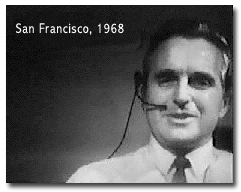 "DOUG Engelbart sat under a twenty-two-foot-high video screen, "dealing lightning with both hands." At least that's the way it seemed to Chuck Thacker, a young Xerox PARC computer designer who was later shown a video of the demonstration that changed the course of the computer world." from What the Dormouse Said, John Markoff.
"DOUG Engelbart sat under a twenty-two-foot-high video screen, "dealing lightning with both hands." At least that's the way it seemed to Chuck Thacker, a young Xerox PARC computer designer who was later shown a video of the demonstration that changed the course of the computer world." from What the Dormouse Said, John Markoff.
re: Explaining Twitter - One of Three Places for People
Update Dec 17, 2009: Facebook's controversial ex-post facto revision of member privacy settings along with the revenue driven rise of apps like Farmville (as well as sleezy internal promotion) lead me to revisit this, see Blog1232: Facebook: A Carnival Midway not a Neighborhood?
Facebook: A Carnival Midway not a Neighborhood?
 Oliver Marks wrote a very good post: Facebook: The Legal Rumblings Start Dec 17, 2009, on the Facebook's potential legal exposure due to its controversial changes to member privacy capabilities and settings. My comment: Oliver -- Very good followup on Facebook's awkward (to put it mildly) changes to selective privacy capabilities which were a large part of their differentiation vs Friendster and MySpace.
Oliver Marks wrote a very good post: Facebook: The Legal Rumblings Start Dec 17, 2009, on the Facebook's potential legal exposure due to its controversial changes to member privacy capabilities and settings. My comment: Oliver -- Very good followup on Facebook's awkward (to put it mildly) changes to selective privacy capabilities which were a large part of their differentiation vs Friendster and MySpace.
With over 70 million folk apparently hooked on "social" games like Farmville, targeted ads that seem to belong on late night TV, and incredibly lame attempts to nag folk get their friends to use Facebook more (giving "viral" a new and flu like meaning), I see Facebook becoming a downscale carnival midway more than a neighborhood. They certainly have a right to do that.
Originally I thought the equally lame and manipulative privacy changes would just contribute to the downmarket feel of the place.
But as you point out - EU privacy laws may land them in legal entanglements too.
Facebook is becoming a bad example rather than a good example for use of social software in the enterprise - or anywhere for that matter. Look out below!
How big a deal is Enterprise 2.0? What do you mean by "Big"?

I'm flattered that Professor Andrew McAfee cites Enterprise 2.0 Schism in his Nov 20, 2009 blog post Enterprise 2.0 is Not THAT Big a Deal, kicking off a neat discussion on serious points behind my tongue in cheek analysis. McAfee agrees that Enterprise 2.0 is a big deal - but "... I don't see E2.0's tools, approaches, and philosophies making obsolete managers, hierarchies, org charts and formal cross functional business processes". There's no need to use a 2.0 version for the Enterprise, but:
Peter Drucker and Enterprise 2.0 | Drucker Centenary
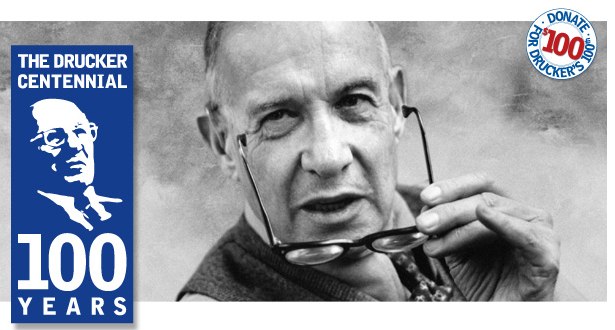 Earlier this week Oliver Marks wrote an excellent post on his Collaboration 2.0 Blog: The Purpose of a Business is to Create a Customer' - Peter Drucker Centenary. Oliver celebrates the Nov 19, 2009 Centenary of Peter Drucker's birth with two of his favorite Drucker bumper sticker quotes: " ‘Knowledge has to be improved, challenged, and increased constantly, or it vanishes‘ and ‘There is an enormous number of managers who have retired on the job‘, which somehow seem to fit together very well." then uses these quotes as context to discuss the disturbing findings of the 2009 Shift Index report and followup analysis by John Hagel, John Seely Brown and Lang Davidson of the Deloitte Center for The Edge. Please read Oliver's full post - you'll like it. Oliver was also used kind words to build on my earlier Enterprise 2.0 Schism post. Here's a slightly extended version of the comment I posted in reply, along with my two favorite Drucker bumper sticker quotes and several links to celebrate Drucker's birth and life.
Earlier this week Oliver Marks wrote an excellent post on his Collaboration 2.0 Blog: The Purpose of a Business is to Create a Customer' - Peter Drucker Centenary. Oliver celebrates the Nov 19, 2009 Centenary of Peter Drucker's birth with two of his favorite Drucker bumper sticker quotes: " ‘Knowledge has to be improved, challenged, and increased constantly, or it vanishes‘ and ‘There is an enormous number of managers who have retired on the job‘, which somehow seem to fit together very well." then uses these quotes as context to discuss the disturbing findings of the 2009 Shift Index report and followup analysis by John Hagel, John Seely Brown and Lang Davidson of the Deloitte Center for The Edge. Please read Oliver's full post - you'll like it. Oliver was also used kind words to build on my earlier Enterprise 2.0 Schism post. Here's a slightly extended version of the comment I posted in reply, along with my two favorite Drucker bumper sticker quotes and several links to celebrate Drucker's birth and life.
Enterprise 2.0 Schism
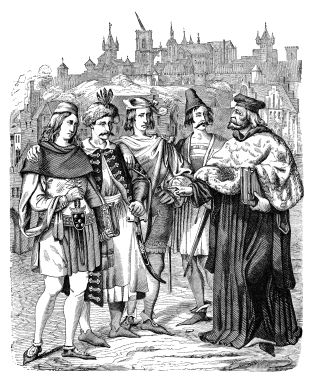 I have to confess that I've enjoyed watching recent rounds of Enterprise 2.0 discussion and mud wrestling. The fact that so many people enjoy debating definitions, values, doctrinal principals - even the existence of Enterprise 2.0 - makes me think that E2.0 might best be framed as a religious debate. With that in mind, I'd like to introduce a new and exciting element: schism.
I have to confess that I've enjoyed watching recent rounds of Enterprise 2.0 discussion and mud wrestling. The fact that so many people enjoy debating definitions, values, doctrinal principals - even the existence of Enterprise 2.0 - makes me think that E2.0 might best be framed as a religious debate. With that in mind, I'd like to introduce a new and exciting element: schism.
Introducing Proteus (demo)
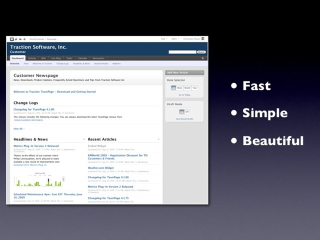
Traction Software Director of User Experience Michael Angeles introduces Traction's new Google Web Toolkit (GWT) based Proteus user interface with a brief tour (video below).
TUG 2009 Providence | Thank you!
 I'd like to thank all of the Traction customers, partners and friends who traveled to Providence last month to make TUG 2009 Providence as enjoyable as it was enlightening. Special thanks to keynote speakers Carmen Medina, Chris Nuzum, Stewart Mader and all of the customers and partners who participated in the Oct 14 Main event. And my personal thanks to everyone on the Traction Software team who worked so hard to bring TeamPage R4.2, the Oracle RDB backend, Attivo Advance Search, and the Proteus Google Web Tookit (GWT) UI to life. I don't know what we'll do to top TUG 2009 next year - but TUG members provides some excellent ideas! See TUG 2009 Providence | Keynotes by Carmen Medina, Chris Nuzum and Stewart Mader for links to TUG videos, slide shows, interviews, tech talks and more, along with how become a TUG member and join the conversation. TUG registration is free and open to the public.
I'd like to thank all of the Traction customers, partners and friends who traveled to Providence last month to make TUG 2009 Providence as enjoyable as it was enlightening. Special thanks to keynote speakers Carmen Medina, Chris Nuzum, Stewart Mader and all of the customers and partners who participated in the Oct 14 Main event. And my personal thanks to everyone on the Traction Software team who worked so hard to bring TeamPage R4.2, the Oracle RDB backend, Attivo Advance Search, and the Proteus Google Web Tookit (GWT) UI to life. I don't know what we'll do to top TUG 2009 next year - but TUG members provides some excellent ideas! See TUG 2009 Providence | Keynotes by Carmen Medina, Chris Nuzum and Stewart Mader for links to TUG videos, slide shows, interviews, tech talks and more, along with how become a TUG member and join the conversation. TUG registration is free and open to the public.
Where's Greg?
 You may have noticed a slow down in blog posts by Jordan and myself, and attributed that to our work for TUG 2009 Providence last week, and you'd be partially right (but it was fun - as you'll learn). You can also blame our slower blog posting to time spent on Twitter, both as individuals: @roundtrip (Greg Lloyd) and @jordanfrank and using the Traction Software corporate feed @tractionteam (which broadcasts the title and a shortened link to new content posted on TractionSoftware.com as well as original tweets).
You may have noticed a slow down in blog posts by Jordan and myself, and attributed that to our work for TUG 2009 Providence last week, and you'd be partially right (but it was fun - as you'll learn). You can also blame our slower blog posting to time spent on Twitter, both as individuals: @roundtrip (Greg Lloyd) and @jordanfrank and using the Traction Software corporate feed @tractionteam (which broadcasts the title and a shortened link to new content posted on TractionSoftware.com as well as original tweets).
Structuring for Emergence
Enterprise 2.0 Social Software is appealing for many reasons, but a core value is the facilitation of emergence. Many in our community may quibble with McAfee's definition of Enterprise 2.0 but I think all will agree that the need to support emergence is a key trait. However, an emergent discussion shines a light on the interacting role of structure and emergence.
2.0 Adoption Council | Neat Tweet!
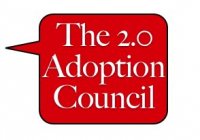
Susan Scrupski (aka @ITSinsider) tweets Sep 22, 2009: reading a great preso by a Council member. great testimony for e20 vendor Traction Software @TractionTeam
re: At What Scale Can Web Services Survive?
9 Months later, I have an answer: 300 Million Users. It's good to see that all that traffic can add up to enough dollars to sustain the service. I wasn't looking forward a cash crunch at FaceBook leading to the dismantling of the network of friends I've spent a few hundred (or maybe a thousand) clicks putting together.
As We May Work - Andy van Dam
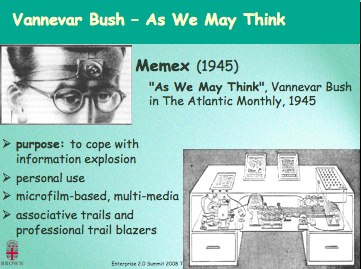
On April 17, 2008 Professor Andy van Dam of Brown University delivered the keynote address of the Enterprise 2.0 Summit 2009 Tokyo. Andy's title is a play on Vannevar Bush's July 1945 essay As We May Think. As We May Think inspired creation of pioneering hypertext systems by Andy, Ted Nelson, Doug Engelbart and others, leading to Tim Berners-Lee and the World Wide Web. The creators of these hypertext systems originally envisioned an environment where individuals could write, link, comment on and share what they wrote as well as search and read what others had written - core capabilities of what we now call social software for the public Web or an Enterprise. Andy's keynote is a personal history, and a vision of how the Web provides a new context for work as well as public communication, socialization, commerce, scholarship and entertainment. For the full slide set see As We May Work (.ppt 8.8MB), posted here with Andy's permission.
Is Twitter Like Going Out for a Smoke? - And Other stories
Bill Ives posted an interesting post Is Twitter Like Going Out for a Smoke?, responding to a Twitter / Water Cooler analogy by Arie Goldshlager and a smoker's network analogy pointed out by Stewart Mader and Gil Yehuda in Lessons from New York Smokers. I commented: Bill -- An interesting post and topic! I think there's likely an interesting history (and sociological studies) of how informal groups form and cross-link in businesses and other organizations.
 I18N ERROR: @tsiskin#footer_RSS_Feed
I18N ERROR: @tsiskin#footer_RSS_Feed